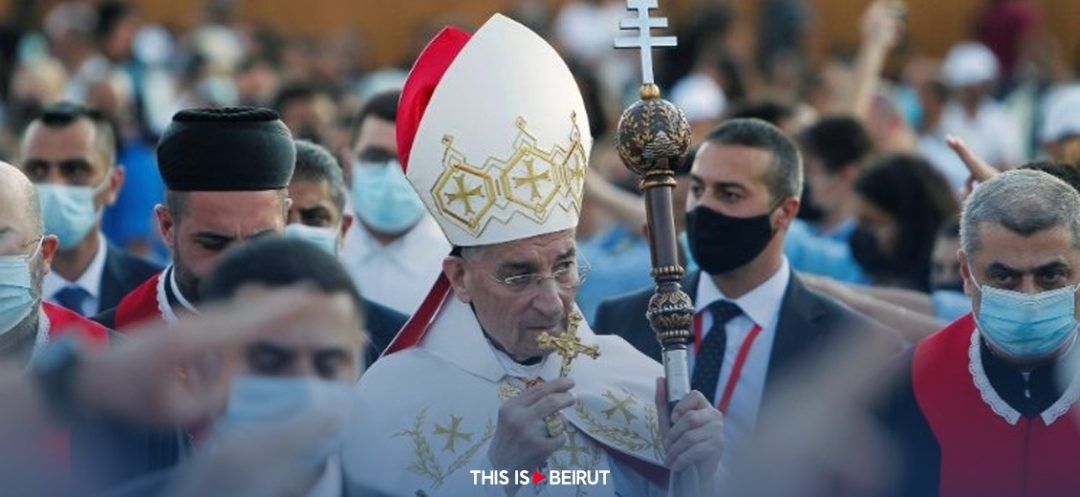- Home
- War in the Middle East
- The Patriarch Once Again in Hezb's Crosshairs

Social media flared up on Sunday and Monday with a smear campaign against the Maronite Patriarch, Bechara Rai, accusing him of "betrayal" and of being the "Arabic-speaking spokesperson" for Israel.
In his Sunday sermon, Patriarch Rai denounced Hezbollah’s military operations against Israel on the southern border. He shared a letter, received from residents of villages in southern Lebanon, in which they expressed their opposition to "the culture of death," referring to the ideology of the pro-Iranian group.
This sermon sparked strong reactions, especially among Hezbollah supporters on social media, where the Maronite Church leader was depicted in Israeli military attire or standing in front of an Israeli flag with the caption, "Arabic-speaking spokesperson for the Israeli army."
— Jalal iskandar (@iskandar_jalal)— Jalal iskandar (@iskandar_jalal) January 29, 2024
Cultural Confrontation
According to Fares Souaid, former MP and president of the National Council for the Liberation of Lebanon from Iranian Occupation, the debate on confronting Hezbollah was launched during a March 14 meeting in 2008. The discussion, he said, which was notably led by Samir Frangieh and Nassir el-Assaad, was both cultural and political. Souaid emphasized that the overarching theme of the March 14 campaign at the time was "We Love Life."
In a statement to This Is Beirut, the former MP specified that most Lebanese reject the culture of violence, and this is the point that Hezbollah is currently focusing on. He emphasized, "This is not an attack against a religious figure," asserting that the campaign targeting Rai bears a striking similarity to the hate campaigns conducted by Israelis in Gaza. "It is a call to violence by an organization that has devastated the country and is pushing communities to isolate themselves," he added. According to Souaid, the best way to defend the Patriarch is by embracing our culture and fostering harmony between Christians and Muslims. "We should not reject the Lebanese formula or give up on coexistence."
Intimidation Message
According to a source within the Lebanese Forces (LF) interviewed by This Is Beirut, there are three underlying reasons driving the current campaign against the Patriarch. First, it stems from the discrepancy between Hassan Nasrallah's pledge to protect southern Lebanon and Hezbollah's commitment to only engage in defensive warfare, while the present situation involves an offensive war causing a major crisis. Second, the policy of "fronts' unity" (referring to groups aligned with Iran, Editor's note) has proven to be misleading. Lastly, concerns have risen about the Israelis' technical and military superiority and the escalating number of casualties within Hezbollah's ranks, causing anxiety within the community that supports the pro-Iranian group.
According to the same source, residents of southern Lebanon have heard their concerns echoed through the Patriarch's statements. They are questioning their involvement in this war and fear the potential loss of their livelihoods and homes. "Hezbollah does not want these types of discussions to occur, so they try to divert people's attention by accusing the Patriarch of treason."
In doing so, the pro-Iranian group and its cyber army are delivering a message of intimidation, insinuating that if the leader of the Maronite Church can be targeted in such a way, one can only presume what might be done to the “average person.” It's a fundamental lesson that Hezbollah wishes to impart, as pointed out by the source, who also noted that the Lebanese Forces and MPs Samy Gemayel and Ashraf Rifi have faced similar defamation campaigns.
In Support of the Patriarch
On Monday, political officials, social media and the press expressed their support for the Maronite Patriarch.
In a statement, the Sovereignist Front asserted that Bkerke and the Patriarch "rise above the attacks of electronic armies and the armies of imaginary victories (in reference to Hezbollah’s "divine" victories, Editor's note). We will not grace them with a reply."
Ragy el-Saad, a member of the Democratic Gathering parliamentary bloc, wrote on his X account that targeting the head of the Maronite Church is counterproductive when supporting a foreign cause. He added that the Patriarch remains a figure of Lebanon’s conscience.
https://twitter.com/Ragyelsaad/status/1751888057236640051
In light of the circumstances, Ghayath Yazbek, a Lebanese Forces MP, urged “detractors” to remain silent. In addressing those who criticize Bkerke, he commented on the X platform, "You live in a country whose borders were drawn by the Patriarchate" (referring to Patriarch Hoayek, who led the Lebanese delegation at the Versailles Peace Conference in 1919).
https://twitter.com/GhayathYazbeck/status/1751874007689761059
In a separate statement advocating for the Patriarch, Paul Kanaan, president of the Gathering of Maronites for Lebanon, dismissed the campaigns targeting the Patriarch, emphasizing that they not only focus on his person but also on what he symbolizes. He highlighted the fact that Patriarch Rai "addresses the fears and concerns of the faithful. It would be more constructive to engage in dialogue with him than attack him."
Hezbollah's notion of “national partnership” seems to be a double-edged sword: it is used to justify dialogue and the election of a president, yet it is conveniently set aside in decisions of war that may lead the country towards destruction. A clear example of this is the demonization of any entity that opposes its choices, with the latest target being the Maronite Patriarch.
Read more




Comments